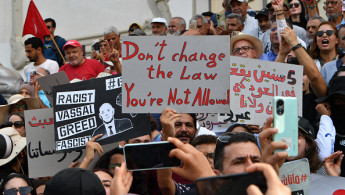Tunisia's parliament to strip power of court election appeals, days before 6 October presidential election
The Tunisian parliament plans to alter the electoral law just a week before the presidential election, leading to widespread protests against the controversial last-minute move. The opposition says the new decree will further undermine democracy in the North African state.
Eighty-nine MPs support stripping the country's administrative court of its authority to rule on election appeals after it opposed the decisions of the President Kais Saied-appointed Independent High Authority for Elections (ISIE) to disqualify three candidates for the 6 October presidential race.
On 25 September, MP Youssef Tarshoun confirmed that the majority in Parliament—elected in an ultra-low turnout election (with only 11% of voters)—primarily approved the new decree.
A final official ruling will be announced today, Friday, 27 September.
If passed, the decree will transfer the power to appeal ISIE's decisions to civil courts.
The Tunisian Judges Association argued in a press release that the new law is "an attempt to entangle the judicial institutions by assigning them tasks outside their competence."
Tunisia's administrative court system reviews the legality of administrative acts as it addresses disputes involving government decisions and public administration and can annul decisions that violate rights.
In contrast, civil courts deal with private law matters, such as contracts and family law, while criminal courts handle offences against the state.
During the week, opposition parties and local rights groups held several protests in the capital, Tunis, to pressure Parliament to annul Friday's voting sessions.
"The authority's decision to change the electoral law in the last quarter of the election campaign is a violation of what remains of state institutions and an infringement on the republican system", said Wissam Al-Saghir, spokesperson for the opposition party of Republicans.
The opposition also believes this step is a preemptive measure to prevent potential appeals to the administrative court after the elections.
There's a high possibility of annulment of the election results because of the electoral authority's non-compliance with the court's early decisions.
ISIE & Administrative Court disagreements
In August, ISIE defied the administrative court's ruling to reinstate three disqualified candidates: Abdellatif Mekki, a former health minister; Mondher Zenaïdi, a former minister under Ben Ali; and Imed Daïmi, a former MP.
Decisions of the administrative court, which has exclusive jurisdiction over electoral candidacy disputes, are legally binding.
Yet, Farouk Bouasker, ISIE's president, stated on 2 September that the commission was "unable to enforce" the court rulings, and the list of presidential candidates "is final and not subject to appeal."
ISIE, which Saied restructured to fall under his control in 2022, only approved three candidates, including Kais Saied. This was a dramatic drop from the twenty-six candidates approved to run in 2019.
On 25 September, presidential candidate Ayachi Zammel was sentenced to six months in prison for falsifying documents, marking the second prison sentence against him in a week.
The head of Tunisia's Azimoun party is one of only three approved candidates, running against incumbent Saied and Zouhair Magzhaoui, a former Saied supporter whose pan-Arabist Echaab party was previously close to the president.
A report by the Carnegie Endowment for International Peace, a Washington-based think tank, found that Saied, a former law professor, has used his power to rewrite the law to undermine his strongest opponents and secure a second term.
Since Saied seized extraordinary power in 2021, he rewrote a constitution that granted him more authority, international and local rights groups have warned of the shrinking freedoms in the country.
Human Rights Watch (HRW) says that holding elections amid such repression makes a mockery of Tunisians' right to participate in free and fair elections.




 Follow the Middle East's top stories in English at The New Arab on Google News
Follow the Middle East's top stories in English at The New Arab on Google News

![A group of Palestinians, foreign and Israeli activists gather to participated in an olive picking event on the land in the town of Battir, which is under threat of confiscation by Israel in Bethlehem, occupied West Bank on 8 November 2024. [Getty]](/sites/default/files/styles/image_330x185/public/2182930803.jpeg?h=199d8c1f&itok=__0LgGsa)
